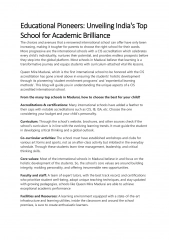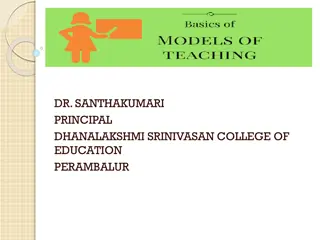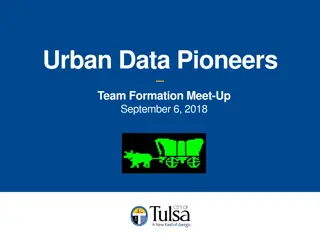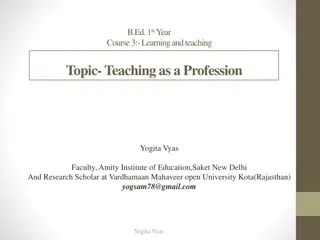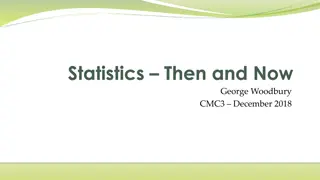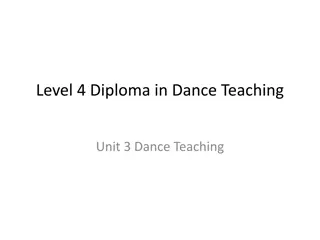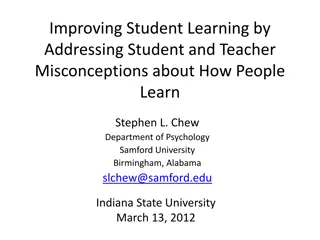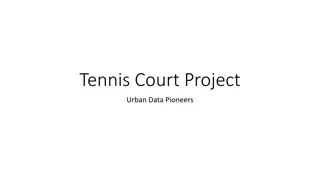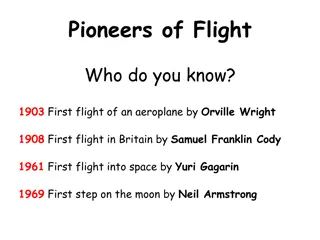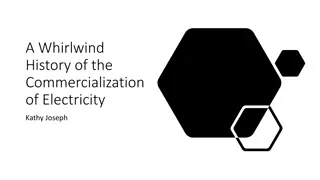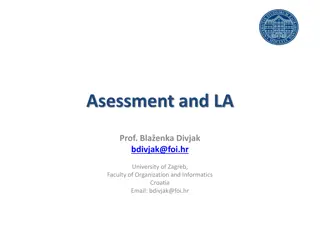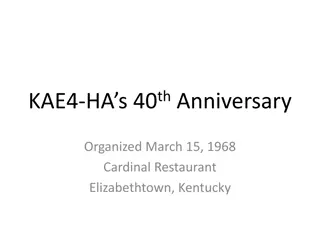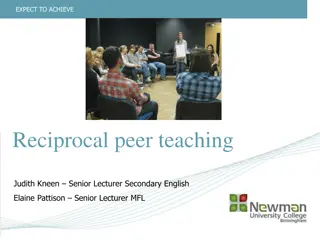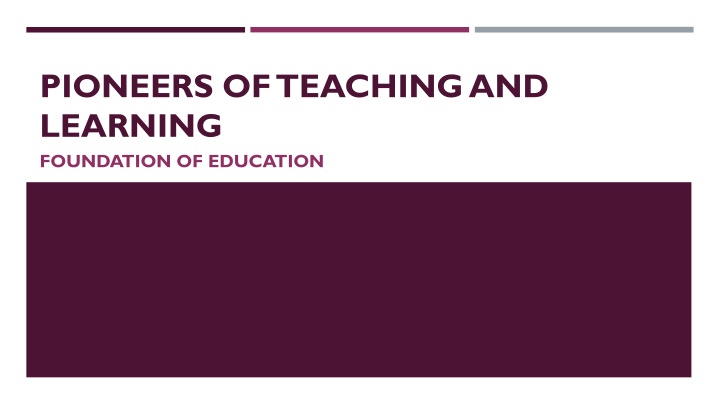
Pioneers of Teaching and Learning: Educational Philosophies and Principles Explored
Delve into the foundation of education through the lens of key pioneers such as Comenius, Rousseau, Pestalozzi, Froebel, Montessori, Dewey, and more. Explore their theories on school, curriculum, and pedagogy, shaping teacher preparation and classroom practices. Uncover arguments among educators advocating for naturalistic learning, experiential education, and social liberation. Discover Jan Komensky's innovative teaching principles focused on respecting children's natural needs and stages of development.
Uploaded on | 1 Views
Download Presentation

Please find below an Image/Link to download the presentation.
The content on the website is provided AS IS for your information and personal use only. It may not be sold, licensed, or shared on other websites without obtaining consent from the author. If you encounter any issues during the download, it is possible that the publisher has removed the file from their server.
You are allowed to download the files provided on this website for personal or commercial use, subject to the condition that they are used lawfully. All files are the property of their respective owners.
The content on the website is provided AS IS for your information and personal use only. It may not be sold, licensed, or shared on other websites without obtaining consent from the author.
E N D
Presentation Transcript
PIONEERS OF TEACHING AND LEARNING FOUNDATION OF EDUCATION
OVERVIEW OF THE CHAPTER Identify the pioneers that developed philosophies, ideas and theories about : school, curriculum, methods of instruction and pedagogy that shape pre-service preparation of teachers in classrooms. Educational Pioneers: Johann Amos Comenius, Jean Jacques Rousseau, Johann Heinrich Pestalozzi Modern Educators: Friedrich Froebel, Maria Montessori, Herbert Spencer, John Dewey, Jean Piaget, Johann Herbart and Paulo Freire Understanding theories like child depravity theory and naturalist theory.
ARGUMENTS AMONG EDUCATORS Education should follow natural stages of human growth and development. Children s learning must be by interaction with objects and situation in their everyday environment (developing life-skills). Learning must be utilitarian (experiential) and with scientific education for learners to adapt successfully to their environment. Education must develop awareness for them to liberate people to their political, economic, social and educational conditions.
JAN KOMENSKY (1592 1670) COMENIUS Born in a Moravian(religious sect) town in Nivnitz and became a bishop of the Moravian Brethren Introduced PANSOPHISM belief that universal shared knowledge will convince people to renounce their ethnic and religious differences and live harmoniously with peace and order. Known as one of the transitional figures during the Renaissance Humanist Education to Naturalistic Education. (learning through the senses rather than passive memorization. Book: Gates of Tongues Unlocked related Latin instruction to Vernacular Language. Lessons began with simple short phrases that gradually become longer and more complex sentences. Made the first picture book as a teaching aid.
COMENIUS TEACHING PRINCIPLES Respecting children s natural needs and interest. He rejected depravity learning (corporal punishment). Teachers must be caring educators and create pleasant classrooms. Avoid hurrying and pressuring pupils, children are efficient when they are ready to learn a particular skill or subject. Lessons must be appropriate to children s natural stages of development. Classroom Teaching principles: Use pictures to illustrate concepts, relate lessons to practical lives, present lessons simply and directly, emphasize general principles before details, emphasize that all creatures and objects are part of the whole universe, present lessons in sequence (stressing one at a time), don t leave a lesson or skill until .students understand it thoroughly. Emphasize on children readiness and the use of concrete objects then proceed to abstract instruction.
JEAN JACQUES ROUSSEAU (1712-1778) Born in Switzerland but with French roots lived during the eighteenth century known as the Age of Reason Focused on the freedom of children from poverty and illiteracy. In his novel Emile he presented his educational theory by having a story of a boy and his education from infancy to adulthood. The story also attacked issues on child depravity and education based only on what s in the book and he also attacked the issues on authoritarian and coercive teaching.
PRINCIPLE OF TEACHING AND LEARNING The book Emile emphasized the following: Developmental stages of a child : Infancy, childhood, boyhood, adolescence and youth (each stage exhibiting readiness in learning) and to preserve the natural goodness of a child, Emile was tutored away from the conformity of a corrupt society. Infancy first contacts with his environment Childhood exploring the world through his senses Boyhood learning natural science through observation and exploration his natural surroundings (learning geography, manual trade, carpentry and mental-physical work) Adolescence entering the society and exposing to a broader world (society, economics, government and business). He travelled European cities for cultural awareness. Made Emile to decide in writing a book that will showcase his natural education that benefited him.
Rosseau highlighted the following key ideas in the foundations of education: (1) childhood is a natural foundation for future human growth and development. (2) children s natural instinct and interest will lead to a more thorough exploration of his environment. (3) human being in their natural life cycles that follows stages of development. (4) Adult coercion leads a negative impact on a child s development.
JOHANN HEINRICH PESTALOZZI (1746-1827) Known to be the educator of the Senses and Emotion Born in Switzerland Concerned with the impact of economic change to families and children A follower of Rosseau he made some significant revisions to Rosseau s methods such as simultaneous group instruction. He believed that if schools are properly organized it could be centers of effective learning. He believed that the mind formed concepts by abstract data conveyed by the senses. He be;ieved in using real objects for instruction for effective learning.
PRINCIPLES OF TEACHING AND LEARNING Warm and secure schools ( child friendly schools ). Organizing teaching generally and specifically/specially Building a home-like environment classroom. This aims to get the students trust and affection. Building up their self-esteem. Sensory learning object lesson: Real objects to abstract . Developing motor coordination by drawing and writing by direct teaching and learning. Instructional strategies: (1) Begin with concrete objects then go abstract concepts (2) begin with the learner s immediate environment before dealing with what is distant and remote (3) begin with easy and simple exercises before introducing complex ones (4) always proceed gradually and cumulatively. Pestalozzi s method became one of the basic principle used in American and European education.
EDUCATION AND SCHOOLING All pioneers (Comenius, Rosseau and Pestalozzi) based their learning principles on natural principles that stressed on human emotions. But unlike Rosseau, Pestalozzi believed in group instruction rather than individual tutoring or home schooling. All of them stressed in empirical or sensory learning. They all believed that children should learn gradually and understand thoroughly what they are studying. Pestalozzi as dedicated to teach children who are poor, hungry, socially and psychologically handicapped. He fed them before he teach them. They believed that a teacher was not only a skilled in instruction but also capable of loving all children. Their principles are applicable in teaching children with special needs as well as children generally.
INFLUENCES IN MODERN EDUCATION Emphasis on students in manipulating objects in their environment (process based learning) Focus on the needs of at-risk children Assertion to emotional security as a pre-condition for skill and subject learning Emphasis on supportive home-school partnerships (parent-teachers teaching partnership)
JOHANN FRIEDRICH HERBART (1776 1841) German professor of philosophy and psychology, that devised an educational method that systemized instruction and encouraged students moral development. He used history and literature to construct networks or ideas in student s minds.
PRINCIPLES OF TEACHING AND LEARNING Apperceptive mass a person can retain and focus an idea in his consciousness. Moral development using history and literature to improve humanistic development and moral values
EDUCATION AND SCHOOLING Sequence of instruction 1. Preparation teachers encourage readiness in students to receive new concepts or learning. 2. Presentation teachers clearly identify the presentation of the new concepts. 3. Association new concept is compared and contrasted with the ideas that students already know 4. Generalization in which principle is formed that combines the new and previous learning. 5. Application appropriate examinations and exercises assess whether students have mastered the new principle.
INFLUENCE IN EDUCATION Using history and Literature to present and teach moral values among students. Usage of a lesson plan for a systematic way of teaching.
FREIDRICH FROEBEL ( 1782 1852 ) German educator that created KINDERGARTEN Children Garden His philosophy is his belief in that an inherent spirituality was at the core of human nature. Every child possess an innate interior of spiritual essence, a power that needs to be externalized. A nationalist, he believed that the people in each country shared a common folk spirit that is manifested in their stories, songs and fables. Taught the importance of storytelling. He was trained under the influence of the Pestalozzian ideals
PRINCIPLES IN TEACHING Kindergarten: a prepared permissive environment Activities must be fun games, play, songs stories and crafts. Stimulation of the child s imagination is important especially for early childhood stage. Introduced nationalistic folk stories heroes and heroines Gifts and occupations as a method of teaching using clay, sand, cardboards and stcks to improve DEXTERITY hand and finger muscles. Importance of teachers personality understanding the child s needs and respect their nature. Create a caring and wholesome environment. Resist the pressure of academic subjects and observe the kindergartens readiness.
HERBERT SPENCER (1820 1903) an English social theorist whose ideas were popular and influential during the 19thand 20thcentury. Ideas on the theory of Charles Darwin. Proponent of Social Darwinism the fittest individuals in each generation would survive because of their skill and intelligence and adaptability. The competition is on ethical force in climbing the socioeconomic ladder of life Different from Pestalozzi and Rousseau, nature meant the law of the jungle and survival of the fittest. He believed in Utilitarian Education in order to learn scientific skills and subjects. He believed on a structured curriculum in science and technology.
INFLUENCE ON PRACTICE TODAY Impact on curriculum design Cardinal Principles on Secondary Education
JOHN DEWEY (1859 1952) He is an American pioneer on experimental philosophy in the context of the social political, scientific and technological changes that were happening in the environment. He encouraged progressivism on social reforms and educational learning through group dynamics Wrote the book The Child and the Curriculum that illustrated experimentalist principles that guided teachers in their Laboratory schools. (1) Children as a socially active human beings eager to explore and learn from their environment. (2) Learners encounter to personal and social problems in their engagement with the environment. (3) Problems stimulate children s use of their intelligence to solve the difficulty and expand their knowledge in an active instrumental manner.

